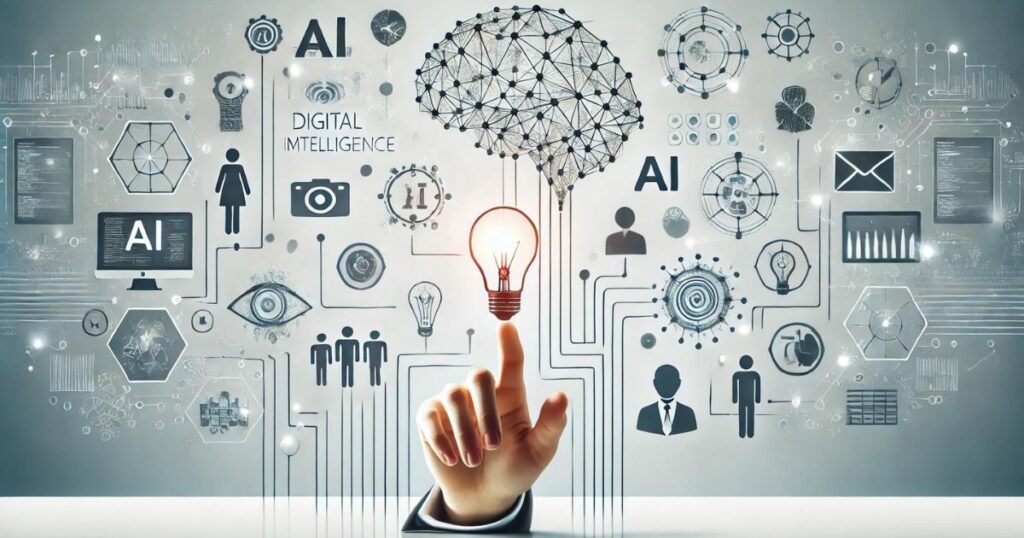In today’s fast-paced world, artificial intelligence (AI) is transforming digital marketing, providing small businesses with tools to level the playing field. From AI-powered automation to smart data analysis, AI can offer insights and streamline marketing processes. But despite these technological advances, human expertise remains crucial. So, how can businesses effectively balance AI and human creativity?
Click here for more information on Digitally Marketed ™
Related Article: The Unveiling the Power of On-Page SEO: Key Insights and Best Practices
What AI Brings to Digital Marketing
Artificial intelligence is revolutionizing how marketing is done, especially for small businesses. Here are some of the keyways AI is changing the landscape:
• Automation and Efficiency: AI tools, such as chatbots and automated email marketing platforms, help small businesses save time and resources. They handle repetitive tasks like answering frequently asked questions or personalizing email campaigns. These tools allow businesses to respond more quickly and efficiently to customer needs without manual intervention at every step.
• Data-Driven Decision Making: AI can analyze vast amounts of data in a fraction of the time it would take a human. Predictive analytics, for instance, can identify trends, customer behaviors, and potential leads. These insights help businesses make more informed marketing decisions, eliminating much of the guesswork.
• Personalization: AI can deliver highly tailored content based on customer data. By analyzing individual behaviors and preferences, businesses can offer personalized product recommendations, targeted ads, and customized communication that connects with customers on a deeper level.
• AI-Powered Content Creation: AI-driven systems can generate content for specific purposes, such as product descriptions, social media posts, or even blog articles. This enables small businesses to scale their content marketing efforts without having to expand their team of writers or creators.
Why Humans Still Matter in Marketing
Despite AI’s many advantages, there are still limitations that make human input essential:
• Creative Thinking and Strategy: AI lacks the ability to think creatively or develop marketing strategies. Small business owners must still be responsible for generating compelling ideas and campaigns that emotionally resonate with their audience. Human marketers understand the subtleties of language, culture, and emotion—factors that are critical for crafting authentic marketing messages.
• Emotional Intelligence: AI can process data and make predictions, but it cannot interpret the emotional or contextual meaning behind customer interactions. Human marketers are needed to adapt and refine marketing strategies based on empathy and an understanding of human behavior, ensuring that messaging remains authentic and relevant.
• Brand Voice and Vision: While AI can generate content, it’s up to human marketers to ensure that it aligns with the brand’s voice and long-term vision. AI may produce generic content, but it’s the human touch that adds the emotional depth and nuance that connects with customers and builds lasting relationships.
• Oversight and Adaptation: AI tools require ongoing supervision to ensure they are functioning properly and producing high-quality results. A lack of human oversight can lead to tone-deaf or irrelevant content. Human marketers ensure that AI-generated material is consistent with the brand’s values and aligns with the overall marketing strategy.
The Future of AI and Human Collaboration
Looking forward, digital marketing will increasingly rely on collaboration between AI and human marketers. AI will continue to handle data analysis, automation, and process-driven tasks, while humans will drive strategy, creativity, and emotional engagement.
For small business owners, this collaboration offers the best of both worlds: AI tools can take care of repetitive tasks and provide valuable insights, allowing human marketers to focus on creative problem-solving and high-level strategic thinking.
Small businesses should embrace AI as a tool that complements their marketing efforts, rather than replacing human input. By using AI to manage time-consuming tasks, businesses can free up more time for innovation and customer engagement.
Common Questions About Using AI for Small Business Marketing
1. How can small businesses use AI for marketing?
AI offers a range of applications for small businesses, including automating customer service with chatbots, personalizing email campaigns, and analyzing customer data to create targeted strategies. Additionally, AI helps streamline content creation and manage social media, making marketing efforts more efficient.
2. What are the best AI marketing tools for small businesses?
Many tools are available for small businesses looking to implement AI in their marketing. These tools can automate tasks like email marketing, customer segmentation, and content creation, allowing businesses to optimize their efforts without needing large teams.
3. Can AI completely replace human marketers?
While AI can automate many marketing tasks, it cannot replace human marketers. AI lacks creativity, emotional intelligence, and strategic thinking, which are essential for building strong connections with customers and executing successful marketing campaigns. Human oversight is still critical to ensure that AI-driven strategies are aligned with brand values.
4. How can AI improve email marketing for small businesses?
AI can optimize email marketing by personalizing content for individual recipients, selecting the best times to send emails, and analyzing engagement data to refine future campaigns. This allows businesses to create more effective email marketing strategies with less manual effort.
Conclusion
AI is undeniably transforming digital marketing for small businesses, offering automation, efficiency, and personalization. However, human creativity, strategic thinking, and emotional intelligence remain irreplaceable in the marketing process. The key to success is leveraging AI as a complementary tool, allowing small businesses to focus on building meaningful connections with their customers and developing innovative strategies. By striking a balance between AI and human expertise, businesses can unlock the full potential of their marketing efforts.

